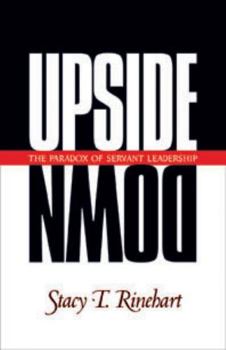Upside Down: The Paradox of Servant Leadership
Select Format
Select Condition 
Book Overview
Servant leadership--the kind of leadership Jesus practiced--is something that sets believers apart. The choice of whether to follow the leadership path to power, authority, and control--or the road to... This description may be from another edition of this product.
Format:Paperback
Language:English
ISBN:1576830799
ISBN13:9781576830796
Release Date:November 2020
Publisher:NavPress Publishing Group
Length:176 Pages
Weight:0.50 lbs.
Dimensions:0.4" x 5.6" x 8.6"
Customer Reviews
3 ratings
A Text Review of "Upside Down: The Paradox of Servant Leadership"
Published by Thriftbooks.com User , 17 years ago
Upside Down by Stacy Rinehart gives the reader a closer look at leadership. The writer puts forth the notion that Jesus had his own style of leading and serving others. Christ's approach to that was a unique methodology that he invented: servant leadership. Though the audience may have a familiarity with this concept, the writer makes it new. Dr. Rinehart feels that this is the biblical model behind leadership. He also conveys to the reader why one should implement this style of leadership as their own. The author feels that these theories most closely represent what Jesus himself practiced while here on earth. "The paradox of servant leadership" is an ironic, yet direct subtitle for this book. It gives the reader a hint at what benefits might follow from learning more about this idea of service through leadership. From the author's own experiences, he defines the difference between secular leadership and sacrificial leadership while laying a solid foundation of how one might get a theological basis for the latter. He asserts that it is the Christian's duty to learn, model, and carry out Jesus-centered leadership. Dr. Rinehart feels that following the model of Jesus will best suit any position in ministry because the Lord has called us, not just ministers, but all of Christendom to be servants. Another focus of the text is to stay away from the lust of power, for this is surely not servanthood. Next, the author shows the reader why he or she would need to act on it. Then, once you see the results from action, you need to share it and disciple others in the same way. Finally, have faith and hopefully your disciples with repeat the cycle for themselves. Somebody has the talent, gift, or calling to be a leader. How might one execute the full potential of this ability? The author freely expounds on this inquisition with passion and poignancy. If we have the right teacher, our education can take us the right way. Our instructor is Christ and his model of guidance is servant leadership. Dr. Rinehart does not necessarily feel that a person is born with this, but a person can be taught these ideas. And surely, if a man or woman is called into the ministry, he or she ought to learn this scriptural model if having success at reaching people is a goal. These are the types of ideas that are found in Upside Down, which is a better than average book. The author does a good job of breaking down the barriers of typical leadership models. His writing is consistent and his vernacular is persistent. However, that is a troublesome area within the book itself. There are only so many ways you can say servant leadership and be talking about its intentions. The book started out excellent, but turns into a weary read toward the end because of the detail the author goes into on what one might label, `the less essentials of leadership.' A fantastic highlight is when the writer moves on from addressing the New Testament times of Christ and devotes much of a chapter to
Challenging expectations
Published by Thriftbooks.com User , 23 years ago
Stacy's book challenges much of the world's expections about leadership. It is written out of his own experiences in secular, military, and religious leadership positions. He therefore make a strong case for his fresh understanding of what God really intends for leaders in all arenas. I'm using it with a group of adults to challenge them to rethink their leadership expectations and accept new roles of leadership in our church.
It's not a long book, and the insights within are profound.
Published by Thriftbooks.com User , 25 years ago
Written for Christian Ministry leaders by a Christian Ministry Executive, this book uses Scripture as its foundation and therefore some readers may be "put off", especially if unfamiliar with the Bible. But it may also prove very thought-provoking for non-Christians. Our own firm is comprised of people with different religious (and non-religious) backgrounds and we've found the concepts presented to be interesting and worthy of discussion. As a member of the Friends (Quakers), I was delighted to see affirmations of our beliefs outlined as the basic tenets of New Testament theology. As a contemporary business leader, I was challenged to embody the spirit of humble service exemplified by early Christians, without the pride and need for power that I so often feel. Highly recommended!






